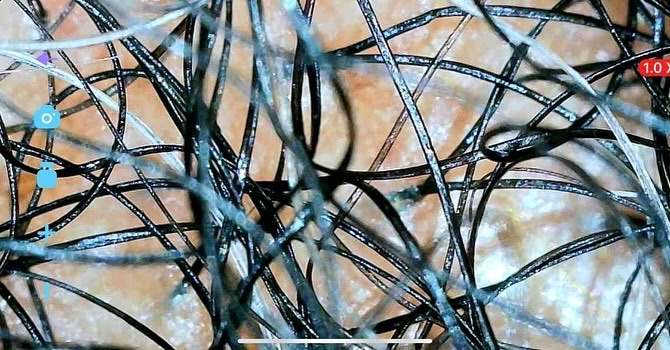Menopause brings about significant hormonal changes that can impact both your hair and scalp. As estrogen and progesterone levels decrease, hair and scalp health can suffer in several ways:
Hair Thinning and Loss Reduced estrogen levels during menopause can slow down hair growth and lead to thinning. Hair may become finer, and some women experience more pronounced hair shedding or hair loss.
Dryness and Fragility Menopause can cause your scalp to produce less oil, leading to dryness. This lack of moisture affects both the scalp and hair, causing hair to become brittle and more prone to breakage.
Dehydration in the Scalp During Menopause: for Chemical and Non-Chemical Hair
The onset of menopause can lead to dehydration of the scalp due to hormonal changes, causing dryness, itching, and flaking. This can affect both chemically treated and non-chemically treated hair, making it essential to focus on scalp hydration.
Whether your hair is relaxed, colored, or natural, nourishing and hydrating treatments for the scalp are critical during menopause. A well-hydrated scalp supports healthy hair growth, prevents irritation, and helps maintain the hair’s overall health.
Scalp Sensitivity : Hormonal changes can also make your scalp more sensitive, leading to issues like itching, flaking, or irritation. Conditions like seborrheic dermatitis may worsen.
Slower Hair Growth: Hair may grow at a slower rate, making it more difficult to recover from hair damage or maintain volume, especially if you have chemically treated hair
Why Scalp Hydration is Important:
As estrogen levels drop during menopause, your scalp may lose moisture more quickly, which can lead to issues such as dandruff, irritation, and even hair loss. Proper hydration helps soothe and replenish the scalp, creating a healthy environment for hair to thrive.
Recommended Scalp Hydration Routine:
Scalp Treatments : Use hydrating scalp treatments designed to lock in moisture and nourish the scalp regularly.
Gentle Cleansing : Opt for sulfate-free shampoos that won’t strip away natural oils, and incorporate moisturizing conditioners into your routine.
Moisturizing Oils : Apply lightweight oils, such as #scalprenew or Vitamain E , to the scalp to prevent dryness and seal in moisture.
Hydration Boost : Incorporate a deep conditioning mask twice a month to give your scalp and hair an extra boost of hydration.
For the best results, it’s crucial to follow a customized scalp hydration plan designed by your trichologist or professional stylist. A tailored approach ensures you are using the right products and treatments for your unique hair and scalp needs, avoiding issues like dryness or irritation. Consistent care is the key to maintaining a healthy, well-nourished scalp during menopause.
#thesalonessentials #thesalonja #hairblog2020 #whatsapp8762898087
